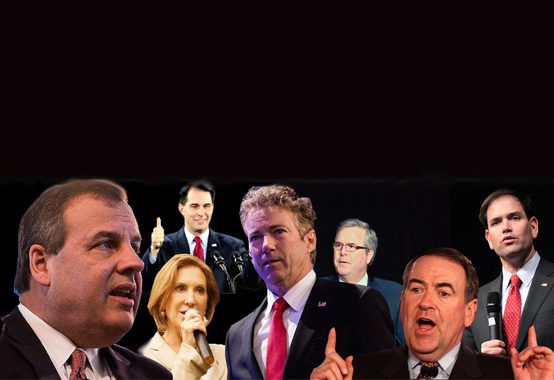The First Republican Debates

The two Republican debates last night were not terribly informative, but then they usually aren’t. Even if I hadn’t already heard the candidates’ pitches many times before yesterday, I don’t think I would have come away with a much better idea of what any of them intend to do once in office than I had at the start. Part of this is a flaw in the format of these “debates,” where most of the candidates in the main debate weren’t addressing the same questions as their competitors. There were a couple of set-piece clashes that the moderators set up between Paul and Christie and Huckabee and Christie over NSA surveillance and entitlement reform respectively, and these were unfortunately among the most substantive exchanges of the evening in the second debate.
Paul demonstrated that he was willing to take on other candidates when he thought it mattered, but except for jabbing Trump at the beginning and trying to shout over Christie he didn’t take advantage of being in the main debate. As I expected, he repeated his opposition to the nuclear deal, but wouldn’t commit to undoing it. It’s a terrible position for him to take on the merits, and it’s one that badly undermines his claim to be a “different kind of Republican.”
Foreign policy received some attention overall, but not as much as I would have expected with the candidates that were on the stage. Syria, the Iran deal, and ISIS were the main foreign policy issues that the moderators asked about, and the answers confirmed that the field is filled with knee-jerk hawks that don’t have a very firm grasp on the issues. When asked specifically about the abortive intervention in Syria in 2013, Carson evaded the question entirely and launched a rambling answer about the need for a bigger military and why we should send weapons to Ukraine.
Walker was asked about his pledge to renege on the nuclear deal, which prompted him to invoke the hostage crisis as proof that “Iran is not a place we should be doing business with,” and then he endorsed reimposing sanctions and “convincing our allies to do the same.” Since we all know that the allies aren’t going to do that, this is a very foolish position to take, and it will come back to bite Walker in the general election if he happens to be the nominee. The P5+1 governments are currently pleading with members of Congress not to reject the deal. Walker is promising to take actions that would horrify our major allies in Europe while pretending to “restore” American leadership. Huckabee’s answer on the deal was predictably no better, and was as dishonest as possible when he insisted that “we got nothing” from the agreement.
When Bush was pressed on another question on Iraq, he gave a muddled response that ended with this statement:
To honor the people that died, we need to — we need to — stop the — Iran agreement, for sure [bold mine-DL], because the Iranian mullahs have their blood on their hands, and we need to take out ISIS with every tool at our disposal.
How it honors the dead from an unnecessary war by scuttling a negotiated agreement that makes another such war less likely is anyone’s guess, but I suppose Bush felt that he needed to remind everyone that his foreign policy judgment was just as bad as everyone else’s on that stage. Bush continues to be an underwhelming candidate, and in spite of the enormous resources that he has I still don’t see how he becomes the nominee.
Oddly enough, Rubio was not given the chance to say anything about foreign policy, which was all the more noticeable when you consider that his Foreign Affairs essay was published just a few days ago. Normalization with Cuba never came up as a topic, which also deprived him of an opportunity to tout his dead-ender pro-embargo views. If Rubio has been languishing in the polls recently, this debate performance isn’t going to do much to improve his standing.
I suspect very few people watched either debate, and FoxNews made it even more difficult for anyone to see it by limiting online access to those with cable subscriptions. The first debate was scheduled so early in the evening that almost everyone across the country would have still been at work while it was going on, but it was generally such an unimpressive display that no one was missing very much. Fiorina stood out simply by being competent as a public speaker, and was widely considered the “winner” of the irrelevant contest. Fiorina’s main contribution to the foreign policy debate, such as it was, was to make this very questionable assertion: “But Iran is at the heart of most of the evil that is going on in the Middle East through their proxies.” Either that means she wrongly thinks ISIS, the Nusra front, AQAP, and other Sunni jihadist groups are Iranian proxies, or she is exaggerating the harm that Iran is doing for ideological reasons. Either way, it confirms that her foreign policy judgment is no better than her competitors’.
Comments